英语五种基本句型及例句
五种基本句型(含练习及答案)

报的一位记者作有关东欧目前局势的重要报告。
翻译:我们发现大礼堂坐满了学生和教师,在听人民日报的 一位同志作有关东欧目前局势的重要报告。
???分析结构: 我们 发现(谓语) 大 礼堂 full of 学生和老师(复数) who 在听(谓语)重要 报告 made by 一位同志 from 人民日报 about 目前局势 in 东欧。
SV 2.My grandma is sleeping now. 3.I will stay in Shanghai for a week.
4.Lucy arrived in Beijing yesterday
基本句型 二
S +V +O(主+谓+宾)
特点:谓语动词都是实义动词,但不能表达 完整的意思,必须跟宾语,即动作的承受者, 才能使意思完整。这类动词叫做及物动词。
▪ leave(留给某人……), leave sb sth (leave sth to sb)
▪ pass(递给某人……), pass sb sth (pass sth to sb)
▪ read(给某人读……), read sb sth (read sth to sb)
▪ write(给某人写……), write sb sth (write sth to sb)
▪ pay(支付给某人……), pay sb sth (pay sth for sb)
▪ buy(为某人买……), buy sb sth (buy sth for sb)
▪ do(为某人做……) do sb sth (do sth for sb)
▪ sing(为某人唱……) sing sb sth (sing sth for sb)
英语五个基本句型和例句

英语五个基本句型和例句English Answer:The five basic sentence types in English are:1. Declarative sentences make a statement. They end with a period (.). Example: "The cat is sleeping."2. Interrogative sentences ask a question. They end with a question mark (?). Example: "Where is the cat?"3. Exclamatory sentences express strong emotion. They end with an exclamation point (!). Example: "Wow, that's a beautiful cat!"4. Imperative sentences give a command or request. They end with a period (.). Example: "Please close the door."5. Compound sentences contain two or more independent clauses joined by a conjunction. Example: "The cat issleeping, and the dog is barking."Chinese Answer:英语中的五个基本句型:1. 陈述句用来陈述事实,句末带句号(.)。
例如,“猫在睡觉”。
2. 疑问句用来提问,句末带问号(?)。
例如,“猫在哪儿?”。
3. 感叹句用来表达强烈的情绪,句末带感叹号(!)。
五种基本句型英语举例

五种基本句型英语举例1主+谓: I laughed.我笑了。
2.主+谓+宾:I love you.我爱你。
3.主+系+表:I am happy.我很幸福。
4.主+谓+宾+宾补:I make you laugh.我让你笑。
5.主+谓+间宾+直宾:I bought her a gift.我给她买了件礼物。
扩展资料一. 基本概念英语(English)属于印欧语系中日耳曼语族下的西日耳曼语支,由古代从欧洲大陆移民大不列颠岛的盎格鲁、撒克逊和朱特部落的日耳曼人所说的语言演变而来,并通过英国的殖民活动传播到世界各地。
二. 基本介绍1.英语(English)作为世界通用语言,是联合国的工作语言之一,也是事实上的国际交流语言。
2.由于在历史上曾和多种民族语言接触,它的词汇从一元变为多元。
语法从“多曲折”变为“少曲折”,语音也发生了规律性的变化。
根据以英语作为母语的人数计算,英语是世界上最广泛的语言。
三. 主要特点1.英语拼写很多情况下与读音不相吻合——多个字母或字母组合发同一个音,同一个字母组合可以发多个音。
如字母A可以发多达八个音;TH组合发三个音如其中Thailand、Thyme、Thames等单词发不规则的/t/音。
2.不发音的字母特别多,如debt、ptarmigan、viscount、island、hour、indict等单词都有不发音的'字母。
3.拼写完全混乱无规可循的单词也很多Czech、Cello、Cafe、One、mnemonic、maugham、Vaughan、chalet、debut等。
4.英语的重音规则复杂,非重读音节中的元音经常弱化变音。
重音位置的变化有时会导致词性、词义的改变,比如名词record (重音在第一个音节)和动词record(重音在第二个音节)。
5.除了拼写不规则和重音不固定外,英语单词的读音还受语境的影响。
比如,当逻辑重音不在can /kn/上时(比如I can go),can 可读作 /k渂/ 。
英语五种基本句型例句100句

英语五种基本句型例句
一、主语+谓语(不及物动词) [S + V]
例句:1、The children are playing happily.孩子们正在高兴地玩。
2、Everybody laughed.大家都笑了。
3、He swims. 他游泳。
二、主语+谓语(及物动词)+宾语[S+V+O]
例句:1、The Greens enjoy living in China.格林一家喜欢住在中国。
2、I love apples.我喜欢苹果。
3、I played the piano.我弹钢琴。
三、主语+谓语+表语[S+V+P]
例句:1、He became a famous doctor. 他成为了一名著名的医生。
2、The apple pie tastes really delicious.苹果派吃起来真是好吃。
3、His eyes are blue.他的眼睛是蓝色的。
四、主语+谓语+间接宾语+直接宾语[S+V+InO+DO]
例句:1、My aunt bought me a computer.我阿姨买给我一台电脑。
2、I gave him my address.我告诉他我的地址。
3、He gave me an apple.他给了我一个苹果。
五、主语+谓语+宾语+宾语补足语[S+V+O+OC]
例句:1、We must keep our school clean.我们必须保持我们的学校清洁。
2、I found the box empty.我发现盒子是空的。
3、I find the clock broken.我看到钟表坏了。
英语五种基本句型
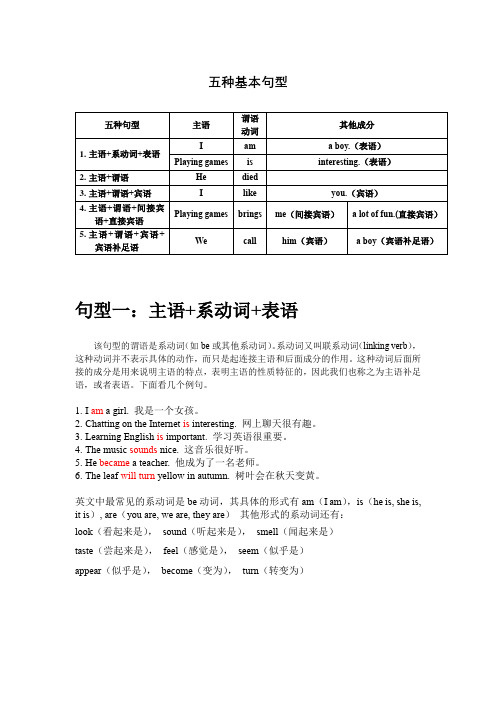
五种基本句型句型一:主语+系动词+表语该句型的谓语是系动词(如be或其他系动词)。
系动词又叫联系动词(linking verb),这种动词并不表示具体的动作,而只是起连接主语和后面成分的作用。
这种动词后面所接的成分是用来说明主语的特点,表明主语的性质特征的,因此我们也称之为主语补足语,或者表语。
下面看几个例句。
1.I am a girl. 我是一个女孩。
2.Chatting on the Internet is interesting. 网上聊天很有趣。
3.Learning English is important. 学习英语很重要。
4.The music sounds nice. 这音乐很好听。
5.He became a teacher. 他成为了一名老师。
6.The leaf will turn yellow in autumn. 树叶会在秋天变黄。
英文中最常见的系动词是be动词,其具体的形式有am(I am),is(he is, she is, it is), are(you are, we are, they are)其他形式的系动词还有:look(看起来是),sound(听起来是),smell(闻起来是)taste(尝起来是),feel(感觉是),seem(似乎是)appear(似乎是),become(变为),turn(转变为)句型二:主语+谓语该句型的谓语动词是不及物动词(intransitive verb),所表示的动作没有作用对象,其本身的意思完整,所以其后不需要带宾语。
下面看几个例子:1.He died. 他死了。
(解析:死(die)这个动作就是主语自主的完成的,并没有作用对象,所以die 这个不及物动词后不能再接宾语了。
)2.These children are playing. 这些孩子们正在玩耍。
(解析:该句的play本身已经表达了完整的意思,没有作用的对象,这句话并不需要告诉我们孩子们在玩什么。
英语五大基本句型及相应例句

英语五大基本句型及相应例句一、主语 + 谓语1.The cat sleeps.2.She sings beautifully.3.They play football every day.4.He reads books in the library.5.We study English together.二、主语 + 谓语 + 宾语1.Tom eats an apple.2.She writes a letter to her friend.3.They watch a movie on weekends.4.I play the guitar at the party.5.We visit the museum on Sundays.三、主语 + 谓语 + 宾语 + 宾语补语1.She painted the wall blue.2.He considers the book interesting.3.They elected her class president.4.The teacher found his answer correct.5.We named our new puppy Rocky.四、主语 + 谓语 + 地点状语1.She works in a hospital.2.We had lunch at the restaurant.3.They play basketball in the gym.4.He reads books in the park.5.I study English at home.五、主语 + 谓语 + 时间状语1.She wakes up early in the morning.2.They have dinner at 7 p.m.3.He goes to bed late at night.4.We go swimming on Saturdays.5.I visit my grandmother every Sunday.通过以上例句的展示,你可以更好地理解英语中的五大基本句型,希望对你的学习有所帮助。
英语五种基本句型

英语五种基本句型五种基本句型见下表(S=主,V=谓,O=宾,P=表,IO=间宾,DO=直宾,OC=宾补):种类句型例句第1种S+V We work. (不及物)第2种S+V+O He plays (及物) the piano.第3种S+V+P We are(系动词) students.第4种S+V+IO+DO She gave(及物) me a pen.第5种S+V+O+OC He made(及物) the boy laugh.一、第1种句型:S+V(主语+不及物动词)1、Birds fly. 鸟飞。
主语+谓语(不及物动词)2、He runs in the park. 他在公园里跑。
主语+谓语+地点状语(不及物动词)此句型是“主语+不及物动词”构成句子的主体部分。
因为是不及物动词,后面当然不能带宾语了,但是可以有状语来修饰。
例如上面例句中的in the park就是地点状语。
3、Class begins.(begin在句中是不及物动词)上课了。
比较:We begin our class at eight. 我们八点钟开始上课。
只能当不及物动词的词(必背!):sleep 睡觉walk 步行swim 游泳happen(take place)发生go去come来work 工作laugh 笑stay呆在……arrive 到达4.中英文互译1.He is running.2.He is running on the ground.3He is running on the ground with his classmates. 4.They arrived. 5.They arrived. Here.6.They arrived here at 10:00 yesterday morning.7.They are talking. 8. .They are talking happily. 9They are talking happily in the office.10 I work every day. 11They study hard. 12.He sings well. 13.She runs very slowly.15The kites fly high. 16.他画画画得好。
英语五种基本句型

英语的五种基本句型1. Subject (主语) +Verb (谓语)这种句型中的动词大多是不及物动词,这些动词常见的有:appear, apologize,arrive, come, die, disappear, exist, fall, happen, rise,等等。
如:The students work very hard.学生们学习很努力。
She apologized to me again. 她再次向我道歉。
The accident happened yesterday evening.事故是昨天晚上发生的。
2. Subject (主语) +Link. V(系动词) +Predicate(表语)这种句型中的系动词一般可分为下列两类:(1)表示状态的连系动词。
这些词有:be, look, seem, appear, smell, taste, sound, keep, remain, 等等。
如:Several players lay flat on the playground.几个队员平躺在操场上。
We should remain modest and prudent any time.我们在任何时候都应该保持谦虚谨慎。
This kind of food tastes terrible.这种食物吃起来很糟糕。
The picture looks more beautiful at a certain distance.这幅画在一定的距离看更漂亮一些。
(2)表示转变或结果的系动词。
这些词有:become, get, grow, turn, go, come, prove,等等。
如:Spring comes. It is getting warmer and warmer.春天到了,天气变得越来越暖和。
Don't have the food. It has gone bad.不要吃那种食物,已经变质了。
英语五种基本句型及例句资料

英语五种基本句型列式如下:基本句型一:S+V(主+谓)基本句型二:S+V+P(主+系+表)基本句型三:S+V+O(主+谓+宾)基本句型四:S+V+IO +O(主+谓+间宾+直宾)基本句型五:S+V+O+C(主+谓+宾+宾补)基本句型一S+V(主+谓)此句型的句子有一个共同特点,即句子的谓语动词都能表达完整的意思。
这类动词叫做不及物动词,后面可以跟副词、介词短语、状语从句等。
基本句型二S+V+P(主+系+表)此句型的句子有一个共同的特点:句子谓语动词都不能表达一个完整的意思,必须加上一个表明主语身份或状态的表语构成复合谓语,才能表达完整的意思。
这类动词叫做连系动词。
系动词分两类:be, look, feel,smell,taste,sound等属一类,表示情况;get, grow, become, turn,go等属另一类,表示变化。
be 本身没有什么意义,只起连系主语和表的作用。
其它系动词仍保持其部分词义另:stay,prove,remain,stand。
基本句型三S+V+O(主+谓+宾)此句型句子的共同特点是:谓语动词都具有实义,都是主语产生的动作,但不能表达完整的意思,必须跟有一个宾语,即动作的承受者,才能使意思完整。
这类动词叫做及物动词。
基本句型四S+V+IO +O(主+谓+间宾+直宾)此句型的句子有一个共同特点:谓语动词必须跟有两个宾语才能表达完整的意思。
这两个宾语一个是动作的直接承受者,另一个是动作的间接承受者。
通常这一间接承受者用一个介词来连接,当动作的间接承受者在动作的直接承受者之前时,这一介词往往被省略。
基本句型五S+V+O+C(主+谓+宾+宾补)此句型的句子的共同特点是:动词虽然是及物动词,但是只跟一个宾语还不能表达完整的意思,必须加上一个补充成分来补足宾语,才能使意思完整。
例句1.They work hard.主+ 谓2.The flower is dead.主+ 系+ 表3.Plants need water.主+ 谓+ 宾4.He gives me some seeds.主+ 谓+ 直宾+ 简宾5.We should keep the plants in the shade.主+ 谓+ 宾+ 宾补6.Many animals live in trees.主+ 谓除了基本句型的成分不变外,通常是在这些成分的前面或后面增加一些修饰语而加以扩大。
英语的五种基本句型是什么 具体怎么用

英语的五种基本句型是什么具体怎么用英语的五种基本句型:1、主+谓+宾(SVO)2、主+谓(系动词+感官动词)+表(SVP)3、主+谓(不及物动词)(SV)4、主+谓+宾+补(SVOC)5、主+谓+宾(直)+宾(间)(SVoO)英语的五种基本句型1英语的五种基本句型主语+谓语我们知道,一个句子是为了说明一件事(或表达一种感情),最简单的表达方式,就是“谁,怎么样了”。
这里的“谁”,就是句子的主语,它的内涵很丰富,可以是人、物、某种行为等。
“怎么样了”,就是句子的谓语,由动词充当。
主语+谓语,即构成一个最简单的句子。
主语+谓语+宾语句型2在句型1的基础上多了一个宾语,宾语是什么呢?还是从句子表达事情的角度看,可以理解为“谁,对谁怎么样了”。
宾语,就是主语借助一个动作(谓语)作用的一个对象。
主语+谓语+间接宾语+直接宾语在这个句型里,我们发现谓语后面跟了两个宾语,直接宾语,就是谓语动词直接作用的对象,而间接宾语,是指谓语需要先借助于一个间接的对象,再把动作传递到直接宾语身上。
主语+谓语+宾语+宾语补足语相对于句型2,这种句型中又多了一个宾语补足语,“补足”意思就是补充说明,所以宾语补足语的作用,就是用来补充说明宾语怎么样了。
主语+系动词+表语还记得系动词吗?我们在动词那一节也讲过哦,这里就不复习了。
这个句型,就是在讲如何使用系动词。
表语,就是跟在系动词后面的成分的一个统称,不用过分在意它是什么意思。
感官类系动词,其后一般接形容词;be动词后一般接名词(或不定式等)。
2英语的常用时态1、一般现在时(习惯性的动作或事情)例句:He likes singing2、现在进行时(am/is/are+doing)例句:We are having English class now3、现在完成时(动作在过去发生,可能会持续下去,强调对现在的影响has/had+done)例句:I ate the dumpling this morning4、一般过去时例句:I finished my homework yesterday5、过去进行时(was/were+doing)例句: we were dancing at 1 oclock yesterday afternoon6、过去完成时(过去的过去had+done)例句: I had studied 4000 words by the end of last term 7、一般将来时例句:I will go shopping tomorrow8、过去将来时(would+v)例句: I would agree his opinion9、将来完成时(will+have+done)例句:I will have finished the study by next year。
英语五大基本句型_

五种基本句型一、主语+谓语(谓语为不及物动词)如:I smiled.He laughed.二、主语+谓语+宾语(谓语为及物动词)如:I like football.I hate selfish people.三、主语+系动词+表语其实这个结构与主谓宾类似,只是一个是实义动词,一个是系动词如:He is a teacher.The flower smells sweet.四、主语+谓语+宾语(somebody)+宾语(something)如:He made me a good man.五、主语+谓语+宾语+宾语补足语这个句型的语后面有两个宾语,这两个宾语放在一起叫双宾语(直接宾语+直接宾语)例如:He made me a cake.Lend me your dictionary, please.这里“me”和“a book”一人一物做宾语就是双宾语这两个宾语:前一个宾语称为"间接宾语",多由代词或名词充当,通常为“人”;后一个宾语称为"直接宾语",往往由名词充当,通常为“物”。
这类句型常有"给某人某物"、"送某人某物"、"留给某人某物"等意思。
常见的这类谓语动词有:give(给某人……),bring(带给某人……), bring somebody somethingtell(告诉某人……), tell somebody somethingsend(送给某人……), send somebody somethingleave(留给某人……), leave somebody somethingpass(递给某人……), pass somebody somethingread(给某人读……), read somebody somethingwrite(给某人写……), write somebody somethingtake(给某人拿……), take somebody somethingshow(给某人看……), show somebody somethingteach(教给某人……), teach somebody somethingget(给某人弄到……), get somebody somethinglend(借给某人……), lend somebody somethingbuy(给某人买……), buy somebody somethingpay(支付给某人……), pay somebody somethinghand(递给某人……) 。
英语五大句型例句每种20个例句
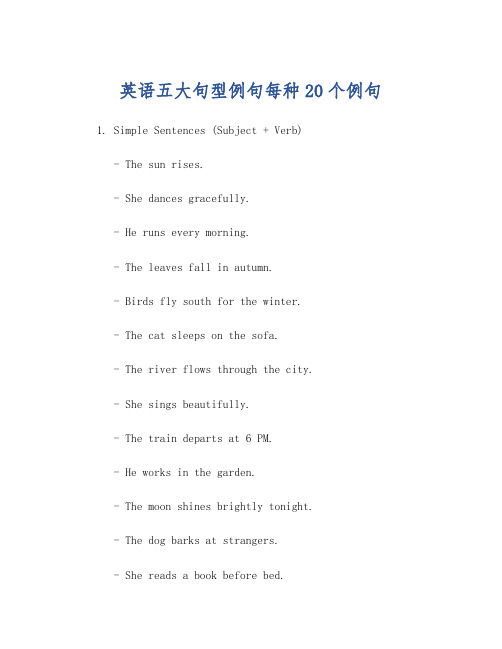
英语五大句型例句每种20个例句 1. Simple Sentences (Subject + Verb)- The sun rises.- She dances gracefully.- He runs every morning.- The leaves fall in autumn.- Birds fly south for the winter.- The cat sleeps on the sofa.- The river flows through the city.- She sings beautifully.- The train departs at 6 PM.- He works in the garden.- The moon shines brightly tonight.- The dog barks at strangers.- She reads a book before bed.- The wind blows gently.- He swims in the ocean.- The flowers bloom in spring.- She cooks dinner for the family.- The car accelerates quickly.- He walks to the store.- The rain falls softly.- The clock ticks loudly.2. Compound Sentences (Subject + Verb + Object) - I read a book about history.- She enjoys eating chocolate.- He plays the piano every evening.- They watch movies on weekends.- The children love playing in the park.- She hates getting up early.- He studies hard for his exams.- The birds eat seeds from my hand.- She listens to music while working.- The teacher assigns homework daily.- He buys groceries on his way home.- The students write essays for class.- She chooses a red dress for the party.- He catches the ball with ease.- The dog fetches the stick.- She opens the door for me.- The wind carries the scent of flowers.- He finds joy in helping others.- The waves crash against the shore.- She paints a picture of the sunset.- The children receive gifts for Christmas.3. Complex Sentences (Subject + Verb + Object +Subordinate Clause)- I will call you when I arrive.- She will be happy if you visit her.- He is reading a book that I recommended.- The cat sleeps where it's warm.- The students will pass the test if they study. - She sings loudly because she is excited.- He is a great athlete despite his age.- The flowers bloom when the weather is warm.- She cooks dinner while the children play.- The train is late because of the storm.- He will succeed if he works hard.- The moon is bright even though it's cloudy.- The dog barks whenever it hears a noise.- She smiles because she is happy.- The wind blows harder as the storm approaches.- He swims faster than anyone else in the team.- The flowers wilt after the rain.- She cries because she is sad.- The car stops when the light turns red.- He feels proud because he finished the race.4. Compound-Complex Sentences- I will call you after I finish my work, and then we can go out for dinner.- She enjoys painting and often spends her weekends in the studio.- He plays the guitar, and his brother plays the drums.- The children play outside, but they come in whenit's dark.- She hates getting up early, so she sets her alarmfor the latest possible time.- He studies hard for his exams, and as a result, he always gets good grades.- The birds eat seeds from my hand, which is why theycome to my garden.- She listens to music while working, and it helps her concentrate.- The teacher assigns homework daily, but the students still enjoy their classes.- He buys groceries on his way home, and he always picks up something special for me.- The students write essays for class, and they learn a lot from the process.5. Sentences with Non-Finite Verbs (Gerunds and Infinitives)- Reading is a great way to relax.- She loves playing the violin.- He stopped to admire the view.- The children enjoy playing games.- I prefer watching movies to reading books.- She hates being woken up early.- He dreams of traveling the world.- The cat dislikes being disturbed while sleeping.- She stopped to listen to the music.- The students are excited about learning new things. - He is good at solving complex problems.- The flowers need watering regularly.- She is considering changing her career.- He is capable of achieving great things.- The dog is trained to fetch the ball.- She is fond of collecting stamps.- The wind is strong enough to move the leaves.- He is interested in learning a new language.- The children are eager to start their summer vacation.。
盘点英语句子的五种基本句型

盘点英语句⼦的五种基本句型盘点英语句⼦的五种基本句型 句⼦由主语和谓语两⼤部分组成。
主语结构⽐较单⼀,谓语结构则不然,不同类别的谓语动词导致不同的谓语结构,从⽽形成了不同的句型(Sentence Pattern)。
以下是⼩编整理的关于英语句⼦的五种基本句型,希望⼤家认真阅读! 1.“主----系-----表”(SLP)句型: 在这种句型中,谓语动词是以be为主的连系动词(Linking Verb),后⾯跟主语补语(Subject Complement),如: These oranges have kept fresh. 这些桔⼦⼀直很新鲜。
Mary is a student / here /in the room. 玛丽是个学⽣/在这⼉/在房间⾥。
有的语法家把be后⾯的副词(短语)或介词短语视为状语,从⽽形成了“主----动-----状”(SVA)这⼀在五种基本句型之外的句型(见上⾯最后⼀个例句)。
2.“主----动”(SV)句型: 在这种句型中,谓语动词为不及物动词(Intransitive Verb),谓语部分通常只包括限定动词,即使有状语,也属任意性状语,即:去掉后并不影响句⼦结构和意义的完整,如: This bread won’t keep (for a long time). 这种⾯包不好(长期)存放。
Tom has left. 前⾯说过,有些句⼦中的状语是不可缺少的,这种状语被称为必具性状语,从⽽构成“主----动----状”(SVA)句型,但这仅限于少数⼏个动词的某些⽤法,因⽽不是⼀种主要句型,如: They are staying in a hotel. 他们暂住在⼀家旅馆⾥。
3.“主----动-----宾”(SVO)句型: 在这种句型中,谓语动词为只带⼀个宾语的及物动词,这种动词被称为单宾语及物动词(Monotransitive Verb),如: He kept the money. 他保存着这些钱。
五种基本句型英语例句
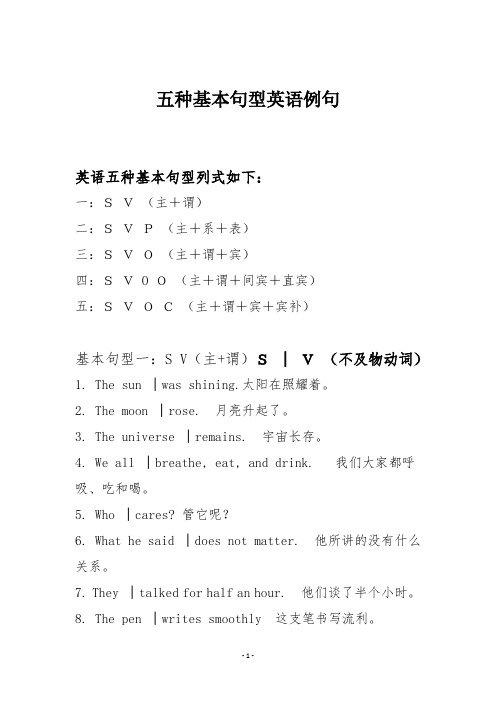
五种基本句型英语例句英语五种基本句型列式如下:一:SV(主+谓)二:SVP(主+系+表)三:SVO(主+谓+宾)四:SV O O(主+谓+间宾+直宾)五:SVOC(主+谓+宾+宾补)基本句型一:S V(主+谓)S│V(不及物动词)1. The sun │was shining.太阳在照耀着。
2. The moon │rose. 月亮升起了。
3. The universe │remains. 宇宙长存。
4. We all │breathe, eat, and drink. 我们大家都呼吸、吃和喝。
5. Who │cares? 管它呢?6. What he said │does not matter. 他所讲的没有什么关系。
7. They │talked for half an hour. 他们谈了半个小时。
8. The pen │writes smoothly 这支笔书写流利。
基本句型二:SVP(主+系+表)此句型的句子有一个共同的特点:句子谓语动词都不能表达一个完整的意思,必须加上一个表明主语身份或状态的表语构成复合谓语,才能表达完整的意思。
这类动词叫做连系动词。
系动词分两类:be, look, keep, seem等属一类,表示情况;get, grow, become, turn等属另一类,表示变化。
be 本身没有什么意义,只起连系主语和表语的作用。
其它系动词仍保持其部分词义。
感官动词多可用作联系动词:look well/面色好,sound nice/听起来不错,feel good/感觉好,smell bad/难闻S│V(是系动词)│P1. This │is │an English-Chinese dictionary.这是本英汉辞典。
2. The dinner │smells │good. 午餐的气味很好。
3. He │fell │in love. 他堕入了情网。
4. Everything │looks │different. 一切看来都不同了。
英语5种基本句型及例句
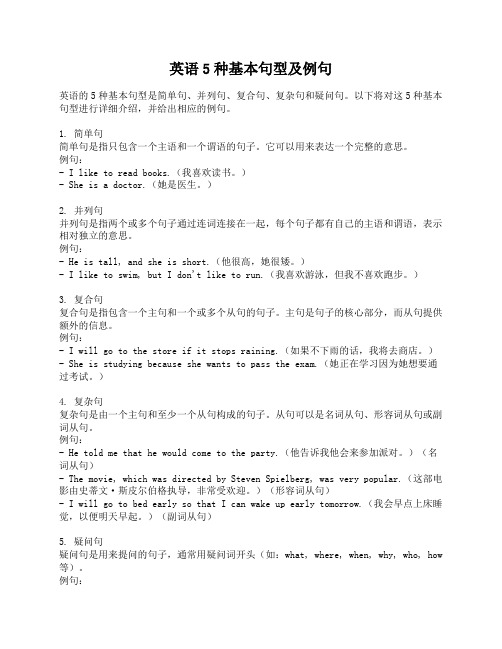
英语5种基本句型及例句英语的5种基本句型是简单句、并列句、复合句、复杂句和疑问句。
以下将对这5种基本句型进行详细介绍,并给出相应的例句。
1. 简单句简单句是指只包含一个主语和一个谓语的句子。
它可以用来表达一个完整的意思。
例句:- I like to read books.(我喜欢读书。
)- She is a doctor.(她是医生。
)2. 并列句并列句是指两个或多个句子通过连词连接在一起,每个句子都有自己的主语和谓语,表示相对独立的意思。
例句:- He is tall, and she is short.(他很高,她很矮。
)- I like to swim, but I don't like to run.(我喜欢游泳,但我不喜欢跑步。
)3. 复合句复合句是指包含一个主句和一个或多个从句的句子。
主句是句子的核心部分,而从句提供额外的信息。
例句:- I will go to the store if it stops raining.(如果不下雨的话,我将去商店。
)- She is studying because she wants to pass the exam.(她正在学习因为她想要通过考试。
)4. 复杂句复杂句是由一个主句和至少一个从句构成的句子。
从句可以是名词从句、形容词从句或副词从句。
例句:- He told me that he would come to the party.(他告诉我他会来参加派对。
)(名词从句)- The movie, which was directed by Steven Spielberg, was very popular.(这部电影由史蒂文·斯皮尔伯格执导,非常受欢迎。
)(形容词从句)- I will go to bed early so that I can wake up early tomorrow.(我会早点上床睡觉,以便明天早起。
英语五种基本句型详解(有例句分析和习题练习)
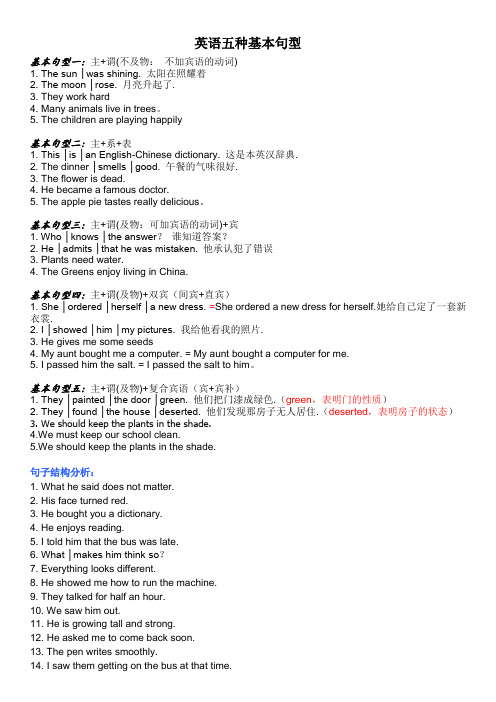
英语五种基本句型基本句型一:主+谓(不及物:不加宾语的动词)1. The sun │was shining. 太阳在照耀着2. The moon │rose. 月亮升起了.3. They work hard4. Many animals live in trees。
5. The children are playing happily基本句型二:主+系+表1. This │is │an English-Chinese dictionary. 这是本英汉辞典.2. The dinne r │smells │good. 午餐的气味很好.3. The flower is dead.4. He became a famous doctor.5. The apple pie tastes really delicious。
基本句型三:主+谓(及物:可加宾语的动词)+宾1. Who │knows │the answer?谁知道答案?2. He │admits │that he was mistaken. 他承认犯了错误3. Plants need water.4. The Greens enjoy living in China.基本句型四:主+谓(及物)+双宾(间宾+直宾)1. She │ordered │herself │a new dress. =She ordered a new dress for herself.她给自己定了一套新衣裳.2. I │showed │him │my pictures. 我给他看我的照片.3. He gives me some seeds4. My aunt bought me a computer. = My aunt bought a computer for me.5. I passed him the salt. = I passed the salt to him。
- 1、下载文档前请自行甄别文档内容的完整性,平台不提供额外的编辑、内容补充、找答案等附加服务。
- 2、"仅部分预览"的文档,不可在线预览部分如存在完整性等问题,可反馈申请退款(可完整预览的文档不适用该条件!)。
- 3、如文档侵犯您的权益,请联系客服反馈,我们会尽快为您处理(人工客服工作时间:9:00-18:30)。
之袁州冬雪创作
英语五种基本句型列式如下:
基本句型一:S +V(主+谓)
基本句型二:S +V +P(主+系+表)
基本句型三:S +V +O(主+谓+宾)
基本句型四:S +V +IO +O(主+谓+间宾+直宾)
基本句型五:S +V +O +C(主+谓+宾+宾补)
基本句型一
S +V(主+谓)
此句型的句子有一个共同特点,即句子的谓语动词都能表
达完整的意思.
这类动词叫做不及物动词,后面可以跟副词、介词短语、
状语从句等.
基本句型二
S +V +P(主+系+表)
此句型的句子有一个共同的特点:句子谓语动词都不克不
及表达一个完整的意思,必须加上一个标明主语身份或状
态的表语构成复合谓语,才干表达完整的意思.这类动词叫
做连络动词.系动词分两类:be, look,
feel,smell,taste,sound等属一类,暗示情况;get, grow,
become, turn,go等属另外一类,暗示变更.be 自己没有什么意义,只起连络主语和表的作用.其它系动词仍坚持其部分词义另:stay,prove,remain,stand.
基本句型三
S +V +O(主+谓+宾)
此句型句子的共同特点是:谓语动词都具有实义,都是主语发生的动作,但不克不及表达完整的意思,必须跟有一个宾语,即动作的承受者,才干使意思完整.这类动词叫做及物动词.
基本句型四
S +V +IO +O(主+谓+间宾+直宾)
此句型的句子有一个共同特点:谓语动词必须跟有两个宾语才干表达完整的意思.这两个宾语一个是动作的直接承受者,另外一个是动作的间接承受者.
通常这一间接承受者用一个介词来毗连,当动作的间接承受者在动作的直接承受者之前时,这一介词往往被省略.
基本句型五
S +V +O +C(主+谓+宾+宾补)
此句型的句子的共同特点是:动词虽然是及物动词,但是只跟一个宾语还不克不及表达完整的意思,必须加上一个补偿成分来补足宾语,才干使意思完整.
例句
1.They work hard.
主 + 谓
2.The flower is dead.
主 + 系 + 表
3.Plants need water.
主 + 谓 + 宾
4.He gives me some seeds.
主 + 谓 + 直宾 + 简宾
5.We should keep the plants in the shade.
主 + 谓 + 宾 + 宾补
6.Many animals live in trees.
主 + 谓
除了基本句型的成分不变外,通常是在这些成分的前面或后面增加一些修饰语而加以扩展.这些修饰语可以是单词(主要是形容词、副词和数词),也可以是各种类型的短语(主要是介词短语、不定式短语和分词短语).下面以基本句型五(v+o+o.c)为例:
We found the hall full.
我们发现会堂坐满了.
We found the great hall full of students and teachers.
我们发现大会堂坐满了学生和教员.
We found the great hall full of students and teachers
listening to an important report.
我们发现大会堂坐满了学生和教员,在听一个重要陈述. We found the great hall full of students and teachers
listening to an important report made by a comrade from the People's Daily on current affairs in East Europe.
我们发现大会堂坐满了学生和教员,在听人平易近日报的一位同志作有关东欧场面地步的重要陈述.
追问:
e额每一个句型举5个例子谢谢
回答:
1. 主语+谓语(不及物动词) [S + V]
如:The children are playing happily.
孩子们正在高兴地玩.
2. 主语+谓语(及物动词)+宾语 [S+V+O]
如:The Greens enjoy living in China.
格林一家喜欢住在中国.
3. 主语+谓语+表语 [S+V+P]
该句型谓语动词为连络动词.罕见的系动词有:
be(是); get(变得), become(成为), turn(变
得), look(看起来), feel(感到), smell(闻起
来), taste(尝起来), sound(听起来), seem(似
乎) 等.如:
① He became a famous doctor.
他成为了一名著名的医生.
② The apple pie tastes really delicious.
苹果派吃起来真是好吃.
4. 主语+谓语+间接宾语+直接宾语 [S+V+InO+DO]
这种句型中的及物动词后跟双宾语,既指人的间
接宾语和指物的直接宾语.也可以把间接宾语放
在直接宾语之后,但要加介词for或to.如:
① My aunt bought me a computer. = My aunt
bought a computer for me. 我阿姨买给我一台
电脑.
② I passed him the salt. = I passed the
salt to him.
我把盐递给他.
5. 主语+谓语+宾语+宾语补足语 [S+V+O+OC]
如:We must keep our school clean.
我们必须坚持我们的学校清洁.
凑合吧
追问:
每一个句型各举五个例子啊一共25个例子哥
哥
回答:
已经给你20个左右了,知足吧
追问:
饿没看到. 我不知道什么是什么句型
回答:
1.They work hard.
主 + 谓
2.The flower is dead.
主 + 系 + 表
3.Plants need water.
主 + 谓 + 宾
4.He gives me some seeds.
主 + 谓 + 直宾 + 简宾
5.We should keep the plants in the shade. 主 + 谓 + 宾 + 宾补
6.Many animals live in trees.
主 + 谓
We found the hall full.
我们发现会堂坐满了.
We found the great hall full of students and teachers.
我们发现大会堂坐满了学生和教员.
We found the great hall full of students and teachers
listening to an important report.
我们发现大会堂坐满了学生和教员,在听一个重要陈述.
We found the great hall full of students and teachers
listening to an important report made by a comrade from the People's Daily on current
affairs in East Europe.
我们发现大会堂坐满了学生和教员,在听人平易
近日报的一位同志作有关东欧场面地步的重要陈述.
我的补偿2010-08-29 11:36 1. 主语+谓语(不及物动词) [S + V]
如:The children are playing happily.
孩子们正在高兴地玩.
2. 主语+谓语(及物动词)+宾语 [S+V+O]
如:The Greens enjoy living in China.
格林一家喜欢住在中国.
3. 主语+谓语+表语 [S+V+P]
该句型谓语动词为连络动词.罕见的系动词有:
be(是); get(变得), become(成为), turn(变得), look(看起来), feel(感到), smell(闻起来), taste(尝起来), sound(听起来), seem(似乎) 等.如:
① He became a famous doctor.
他成为了一名著名的医生.
② The apple pie tastes really delicious.
苹果派吃起来真是好吃.
4. 主语+谓语+间接宾语+直接宾语 [S+V+InO+DO]
这种句型中的及物动词后跟双宾语,既指人的间接宾语和指物的直接宾语.也可以把间接宾语放在直接宾语之后,但要加介词for或to.如:
① My aunt bought me a computer. = My aunt bought a computer for me. 我阿姨买给我一台电脑.
② I passed him the salt. = I passed the salt to him.
我把盐递给他.
5. 主语+谓语+宾语+宾语补足语 [S+V+O+OC] 如:We must keep our school clean.
我们必须坚持我们的学校清洁.。
